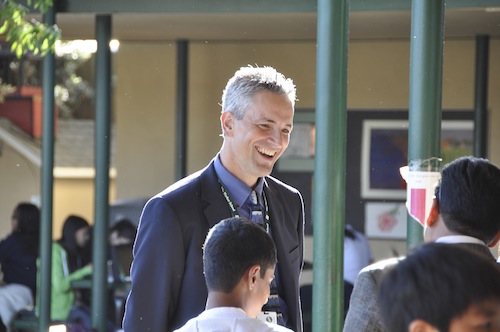This article originally appeared in the winter 2013 Harker Quarterly.
When I was a boy, my father used to sing the song “Que Sera, Sera.” He had a nice voice, though he didn’t take singing seriously. At least, he sounded nice to me, his son. I used to believe that all fathers sounded nice to their sons until my boys disproved this theory by protesting fiercely at my singing. Apparently a son loving his father’s voice is not a biological mandate.
“Whatever will be, will be. The future’s not ours to see. Que sera, sera.” A beautiful, timeless song, with deep advice, the gravity of which is somewhat sweetened away by Doris Day’s voice in her 1956 recording. “The future’s not ours to see.” I don’t know that my father even fully believed this at the time, though this was one of his favorite songs. Who among us believes that the future is not ours in any capacity? We tend to live for the future.
Which brings me to the paradox of schooling. Schools are completely engineered for the future. Schools prepare students for the future and hope to shape the future in part through graduating great students. The class is a laboratory for the future, the school an altar to an anticipated better future for our children and society.
Not that this is bad – we have to plan and prepare for the future. But as the philosopher Alan Watts reminds us, the future is good only for those who know how to live in the present. It is no good to prepare for the future if, when it arrives, we do not know how to enjoy it. Those who are always preparing for tomorrow do not see or enjoy the present. Tomorrow never comes anyway, we are told.
There is a popular quote from computer scientist Alan Kay that says, “The best way to predict the future is to invent it.” Not according to Doris Day. Nor Steve Jobs. He said as much in his now famous 2005 Stanford commencement address in which he advised the following: “You can’t connect the dots looking forward; you can only connect them looking backward.” Though Jobs is often credited with inventing the future, by his account the future was not his to see.
If you don’t believe Doris Day or Steve Jobs, try the great German philosopher Arthur Schopenhauer. He predated Steve Jobs’ sentiment by about a century and a half: “The scenes in our life resemble pictures in a rough mosaic; they are ineffective from close up, and have to be viewed from a distance if they are to seem beautiful.” Later in this passage Schopenhauer warns us that we inadvertently look into the future for an imagined joy that usually is right in front of us.
But I suppose it cannot be helped, especially for students. Kids today live in a competitive world, it is said, and they have to prepare for it. We have college and work readiness assessments now. The Berlin Wall has fallen and the Internet has flattened the world. However, the flatter earth has not made the horizon any easier to spot; the future’s not ours to see, so we are anxious about it. We are anxious for our children and they learn how to be anxious through us.
Perhaps we need only to teach children to live in the present and the future will take care of itself. Young children do not need this teaching; they can teach us. But older kids, say around late middle school on, typically begin to assume the anxiety worn by adults. In most fairy tales a child, usually around adolescence, loses something made of gold and has to find it again.
A December 2010 edition of The Economist has as its lead article a piece capturing how life really begins at age 46, the nadir of happiness, after which things look up. Adults after middle age, one theory goes, begin to drop old ambitions and accept what good they have in their lives. It might be the height of presumption to think that we can help our children avoid this trajectory and start enjoying their lives now. But shouldn’t we try? Their future – and their present – depend on it.
